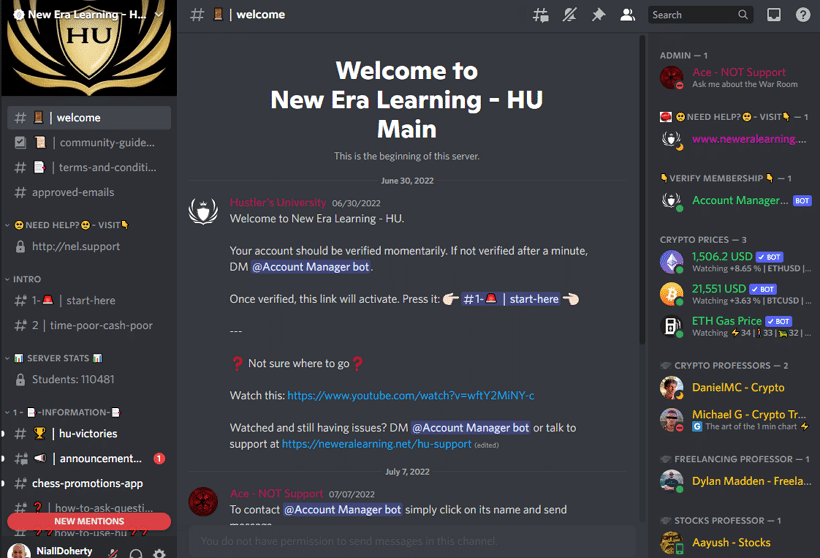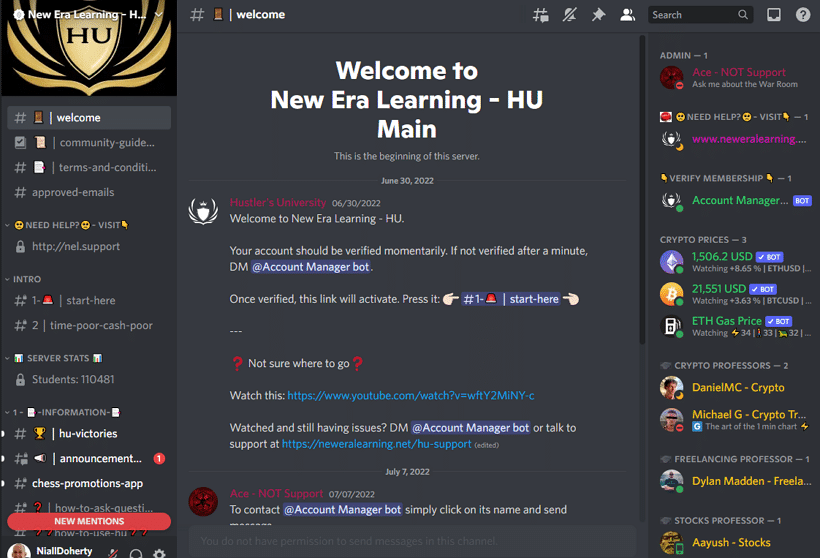Does Hustlers University still exist? This question, once a whisper in online communities, has become a full-blown conversation, prompting an exploration of its rise, fall, and enduring impact. Hustlers University, a platform that promised quick riches through online courses and mentorship, quickly gained popularity, drawing in individuals seeking shortcuts to financial success. However, controversies surrounding its methodologies and the questionable nature of its claims led to its demise.
This exploration delves into the legal and ethical implications of Hustlers University’s business model, analyzing the potential benefits and drawbacks for participants. We’ll examine the platform’s impact on online learning, the role of social media in its promotion, and the lessons learned from its rise and fall. Ultimately, we’ll discuss the importance of financial literacy and critical thinking in navigating the complex world of online business opportunities.
The Legal and Ethical Implications
The controversy surrounding Hustlers University raises critical questions about the legal framework governing online courses and marketing practices, particularly in the context of promoting “get-rich-quick” schemes. This section delves into the legal and ethical considerations surrounding such ventures, exploring the potential pitfalls and highlighting the importance of responsible online education and marketing.
The Legal Framework Surrounding Online Courses and Marketing Practices
The legal landscape surrounding online courses and marketing practices is complex and evolving. The Federal Trade Commission (FTC) plays a significant role in regulating deceptive marketing practices, including those related to online education. The FTC’s guidelines emphasize transparency and accuracy in advertising, requiring marketers to clearly disclose all material facts about their products and services.
- Truthful Advertising: The FTC prohibits false or misleading claims about the effectiveness of online courses, including guarantees of financial success or unrealistic promises of rapid wealth.
- Disclosure of Material Facts: Marketers must disclose all material facts about the course, such as the qualifications of the instructors, the content of the course, and the refund policy.
- Substantiation of Claims: Marketers must have reasonable substantiation for any claims made about the benefits of their online courses. This means providing evidence to support any claims of success or effectiveness.
Beyond the FTC, state laws and regulations also apply to online education and marketing practices. For example, some states require online course providers to be licensed or registered. Additionally, consumer protection laws may provide recourse for students who feel they have been misled or defrauded.
Ethical Considerations of Promoting “Get-Rich-Quick” Schemes
The ethical implications of promoting “get-rich-quick” schemes are significant. While online education can provide valuable opportunities for learning and personal growth, it’s crucial to differentiate legitimate educational programs from those that exploit the desire for quick wealth.
- Transparency and Honesty: Ethical online educators should be transparent about the content of their courses, the qualifications of their instructors, and the potential risks and challenges involved. They should avoid making unrealistic promises or guarantees of financial success.
- Emphasis on Skill Development: Ethical online courses should focus on teaching practical skills and knowledge that can help students build a sustainable career or business. They should avoid promoting quick fixes or get-rich-quick schemes that often rely on unsustainable or unethical practices.
- Social Responsibility: Online educators have a responsibility to ensure their courses are ethical and do not contribute to harmful practices such as financial exploitation or pyramid schemes.
Legal Cases and Regulatory Actions Related to Hustlers University
While Hustlers University has faced criticism and scrutiny, there have been no official legal cases or regulatory actions specifically targeting the program. However, the FTC has issued warnings and taken action against similar ventures that have engaged in deceptive marketing practices and made unsubstantiated claims about financial success.
- FTC Actions Against “Get-Rich-Quick” Schemes: The FTC has a history of cracking down on companies that promote “get-rich-quick” schemes that are based on false or misleading claims. The FTC has filed lawsuits against companies that have engaged in deceptive marketing practices, such as making false promises of high earnings or hiding the true costs of their programs.
- State Consumer Protection Laws: Students who feel they have been misled or defrauded by online courses may be able to seek recourse through state consumer protection laws. These laws vary from state to state, but they generally provide consumers with the right to sue businesses that engage in unfair or deceptive business practices.
The Evolution of Online Learning Platforms
The rise of online learning platforms has revolutionized the way people acquire knowledge and skills. From traditional online courses to interactive learning experiences, the landscape of online education is constantly evolving, presenting both opportunities and challenges. Hustlers University, with its focus on “hustling” and unconventional methods, stands out as a unique example within this diverse ecosystem.
Comparison with Other Platforms
Hustlers University’s approach to learning differs significantly from traditional online learning platforms. While most platforms emphasize structured curricula, accredited courses, and established academic standards, Hustlers University focused on practical skills, real-world strategies, and a community-driven learning environment.
- Traditional Online Learning Platforms: These platforms, like Coursera, edX, and Udacity, offer courses from renowned universities and institutions. They focus on academic rigor, structured learning paths, and often lead to certifications or degrees.
- Skill-Based Platforms: Platforms like Skillshare, Masterclass, and Udemy cater to specific skills and interests. They offer courses taught by industry experts and professionals, focusing on practical application and project-based learning.
- Community-Driven Platforms: Platforms like Reddit, Discord, and online forums foster communities around specific interests and provide peer-to-peer learning opportunities. They offer a more informal and collaborative learning environment, relying on shared experiences and knowledge.
Key Trends and Innovations
The online learning landscape is constantly evolving, driven by technological advancements and changing learner needs. Key trends and innovations include:
- Personalized Learning: Adaptive learning platforms leverage AI and data analytics to tailor learning experiences to individual needs and preferences.
- Gamification: Incorporating game mechanics into learning platforms increases engagement, motivation, and retention.
- Virtual Reality (VR) and Augmented Reality (AR): Immersive technologies offer realistic simulations and interactive learning experiences, enhancing engagement and knowledge acquisition.
- Micro-Learning: Short, focused learning modules cater to busy learners, allowing them to acquire knowledge in bite-sized chunks.
Ethical and Regulatory Challenges
The rapid growth of online learning platforms raises ethical and regulatory concerns:
- Quality Control: Ensuring the quality and credibility of online learning content is crucial, as the lack of traditional academic oversight can lead to misinformation and misleading claims.
- Data Privacy and Security: Online learning platforms collect vast amounts of personal data, raising concerns about data privacy and security breaches.
- Accessibility and Equity: Ensuring equitable access to quality online learning opportunities for all learners, regardless of background or socioeconomic status, is a critical challenge.
The Legacy of Hustlers University

Hustlers University, despite its short lifespan, left an indelible mark on the online learning landscape. Its meteoric rise and subsequent demise offer valuable lessons about the evolving nature of education and the challenges of building sustainable online businesses. Examining its legacy allows us to understand the broader implications for the future of online entrepreneurship.
The Impact of Hustlers University on Online Learning
Hustlers University’s influence on online learning is undeniable. Its unique approach, emphasizing quick-win strategies and unconventional methods, attracted a large and enthusiastic audience. However, this focus on shortcuts and rapid results also drew criticism, highlighting the potential pitfalls of prioritizing speed over substance.
- Increased Awareness of Online Learning: Hustlers University’s popularity brought online learning into the mainstream, particularly among younger audiences. This heightened awareness led to a surge in interest in alternative educational pathways, especially those related to entrepreneurship and digital skills.
- Shifting Focus to Practical Skills: The platform’s emphasis on practical skills and real-world applications challenged the traditional model of online education, which often prioritized theoretical knowledge. This shift in focus encouraged a demand for more hands-on, results-oriented learning experiences.
- Rise of “Gurus” and Influencer Culture: The platform’s founder, Andrew Tate, emerged as a prominent figure in the online learning space, exemplifying the growing influence of “gurus” and influencers. This trend has led to a rise in online courses and programs marketed by individuals with strong personal brands, rather than established institutions.
Lessons Learned from the Platform’s Rise and Fall
Hustlers University’s rapid rise and subsequent closure provide valuable insights into the challenges of building sustainable online businesses. The platform’s focus on quick-win strategies and its reliance on controversial marketing tactics ultimately proved unsustainable.
- Importance of Long-Term Value: The platform’s emphasis on shortcuts and rapid results failed to provide lasting value to its students. This underscores the importance of focusing on long-term value creation in online learning, emphasizing sustainable skills and knowledge that can lead to ongoing success.
- Ethical Considerations in Online Marketing: Hustlers University’s marketing tactics, which often involved aggressive and misleading claims, raised ethical concerns. This highlights the importance of ethical marketing practices in the online learning space, ensuring transparency and avoiding deceptive or exploitative strategies.
- Building a Strong Community: The platform’s lack of a strong community contributed to its downfall. Students were primarily motivated by individual gain, lacking a sense of belonging or shared purpose. This emphasizes the importance of fostering a supportive and engaged community in online learning, creating a sense of connection and shared values.
Implications for the Future of Online Entrepreneurship
The legacy of Hustlers University has broader implications for the future of online entrepreneurship. The platform’s rise and fall demonstrate the need for a more ethical and sustainable approach to online business building.
- Focus on Sustainable Business Models: The platform’s reliance on short-term gains ultimately led to its downfall. Future online businesses need to prioritize sustainable models, focusing on long-term value creation and ethical practices.
- Importance of Transparency and Authenticity: The platform’s marketing tactics raised concerns about transparency and authenticity. Future online entrepreneurs need to prioritize open communication, genuine relationships, and ethical marketing practices.
- Building a Strong Community: The platform’s lack of a strong community contributed to its downfall. Future online businesses need to prioritize building a supportive and engaged community, fostering a sense of belonging and shared values.
The Importance of Financial Literacy and Critical Thinking: Does Hustlers University Still Exist

In the realm of online business opportunities, financial literacy and critical thinking are essential skills that can help individuals navigate the complexities of the digital landscape and make informed decisions. These skills are crucial for evaluating the legitimacy of online ventures, recognizing potential scams, and making sound financial choices.
The Importance of Financial Literacy
Financial literacy empowers individuals to understand and manage their finances effectively. In the context of online business opportunities, it equips individuals with the knowledge to assess the financial viability of ventures, evaluate investment opportunities, and make informed decisions regarding their finances. For example, understanding basic financial concepts such as return on investment (ROI), risk assessment, and cash flow analysis can help individuals make informed decisions about whether to invest in a particular online business opportunity.
The Dangers of Falling Prey to Scams and Misleading Promises, Does hustlers university still exist
The online world is rife with scams and misleading promises, often targeting individuals seeking quick riches or easy ways to make money. Lack of financial literacy and critical thinking skills can make individuals vulnerable to these deceptive schemes. For instance, individuals may fall prey to pyramid schemes, where they are promised high returns for recruiting new members rather than actual product sales.
Developing Financial Literacy and Critical Thinking Skills
Cultivating financial literacy and critical thinking skills is an ongoing process that requires continuous learning and practice.
- Seek reliable sources of information: Reputable financial institutions, government agencies, and educational institutions provide valuable resources on financial literacy.
- Engage in critical thinking exercises: Regularly challenge assumptions, question claims, and evaluate evidence before making decisions.
- Develop a healthy skepticism: Be wary of promises that sound too good to be true, and avoid investing in ventures that lack transparency or credibility.
- Seek guidance from financial professionals: Consulting with a qualified financial advisor can provide valuable insights and support in navigating the complexities of online business opportunities.
The legacy of Hustlers University serves as a cautionary tale, highlighting the dangers of relying on get-rich-quick schemes and the importance of critical thinking in evaluating online business opportunities. While the platform itself may be gone, the lessons learned from its existence continue to shape the online learning landscape, reminding us to prioritize ethical practices, transparency, and genuine education over quick and dubious promises. As the world of online entrepreneurship continues to evolve, understanding the pitfalls of the past is essential to building a more sustainable and ethical future.
While Hustlers University might be a thing of the past, there are still plenty of legitimate opportunities to learn about finance and build a career in the field. If you’re interested in a more traditional path, you can explore financial advisors jobs near me and gain valuable experience working with clients directly. Regardless of your chosen path, financial literacy is crucial for success, and there are many resources available to help you develop the skills you need.
While Hustlers University might not exist in its original form, the entrepreneurial spirit behind it lives on. Many of the courses offered by the platform are still available, and you can find out more about their pricing here. Whether or not Hustlers University still exists in its original form, its impact on the world of online business education is undeniable.







